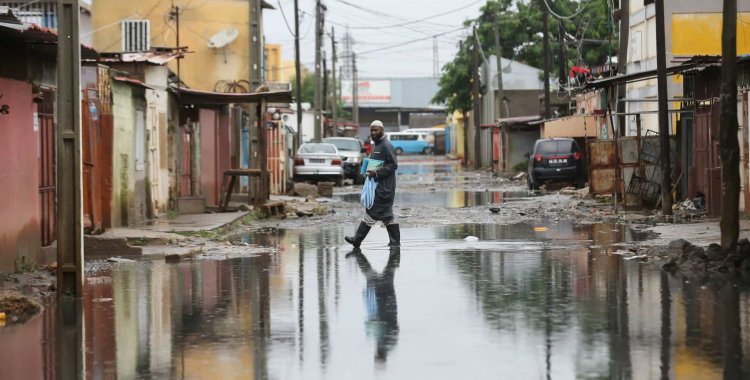In the inner suburbs of Luanda, the landscape has been transformed into endless lagoons, making it difficult for vehicles and citizens to move around. Children and adults sometimes have no choice but to cross them.
When heard by Lusa, citizens of the capital are clamoring for an "urgent response" from the authorities to get rid of the waters that surround their residences and fear that the worst is not over yet, given the rain forecast for this month.
The heavy rainfall dragged huge piles of garbage, still visible in several districts of the capital, and in the bay of Luanda, threatening the marine biodiversity with thousands of bottles and plastic bags among the waste.
Similar to dozens of neighborhoods in Luanda, in the Mota neighborhood, urban district of Sambizanga, the damage from the rains is incalculable, with flooded streets and submerged houses and residents lamenting the consequences of the high rain load.
"Sambizanga here is terrible, because in my house a lot of water came in, it ruined almost everything. The government should do something so that this water can drain here, because we have a retention basin here", Emília Domingos Pireza, 57 years old, told Lusa.
Natural of Sambizanga and resident of the known area of "Giló", she circulates in rubber boots, commonly called in Luanda as "mata cobra", the only means that guarantees the mobility to other points of the "Sambila", whose card-de-visita are the lagoons.
"Here to circulate it is only by 'mata cobra', otherwise you either step in the water to buy something to eat. The situation is complicated and it's still going to rain and I don't know how I'm going to do it," he lamented.
António Moreira dos Santos, who has been in Sambizanga for 20 years, said that the scenario of impassable streets and submerged houses in that part of Luanda "repeats itself year after year" and asks for "urgency in the resolution of the waters that continue to invade the residences.
He also complained about the "lethargy" of the district administration, arguing that the situation should be solved with funds from the PIIM (Integrated Plan for Intervention of Municipalities), approved in 2020 by the President for the construction of local infrastructure.
"Because here the commission has already tried to solve this [removing the water], because even with the PIIM money, which the administration receives, I think they should already think about this situation, but nothing is seen," he shot back.
The consequences of the rains were also described by Anacleta de Oliveira Cláudio, resident of Rua da Lama, in Sambizanga, who mentioned that many neighbors had to abandon their residences as a measure to safeguard their lives.
"The water [in the streets] is above the knee and without boots we really have to step in the water. And we are in a bad way because there are still many rains ahead and we fear for the worst if it rains that hard again," she lamented.
The elderly Maria Emília, 73 years old, from Sambizanga, who saw her house transformed into a swamp, told Lusa that the rains, which also entered through the damaged ceiling of her small room, didn't spare her appliances.
"I'm here in a suffering, every time the rain falls, the rain was too much, I cried because I couldn't stand it anymore, all the water from the street invaded the whole house and the backyard and I'm not bearing this situation anymore," she vented, asking for help from people of good will.
The provisional balance sheet presented on Monday by the Civil Protection and Fire Department indicated that 14 people died, hundreds of houses flooded and others partially collapsed as a result of the rains.







